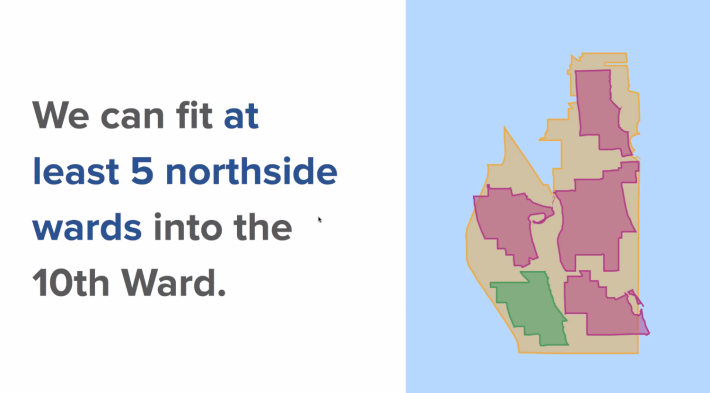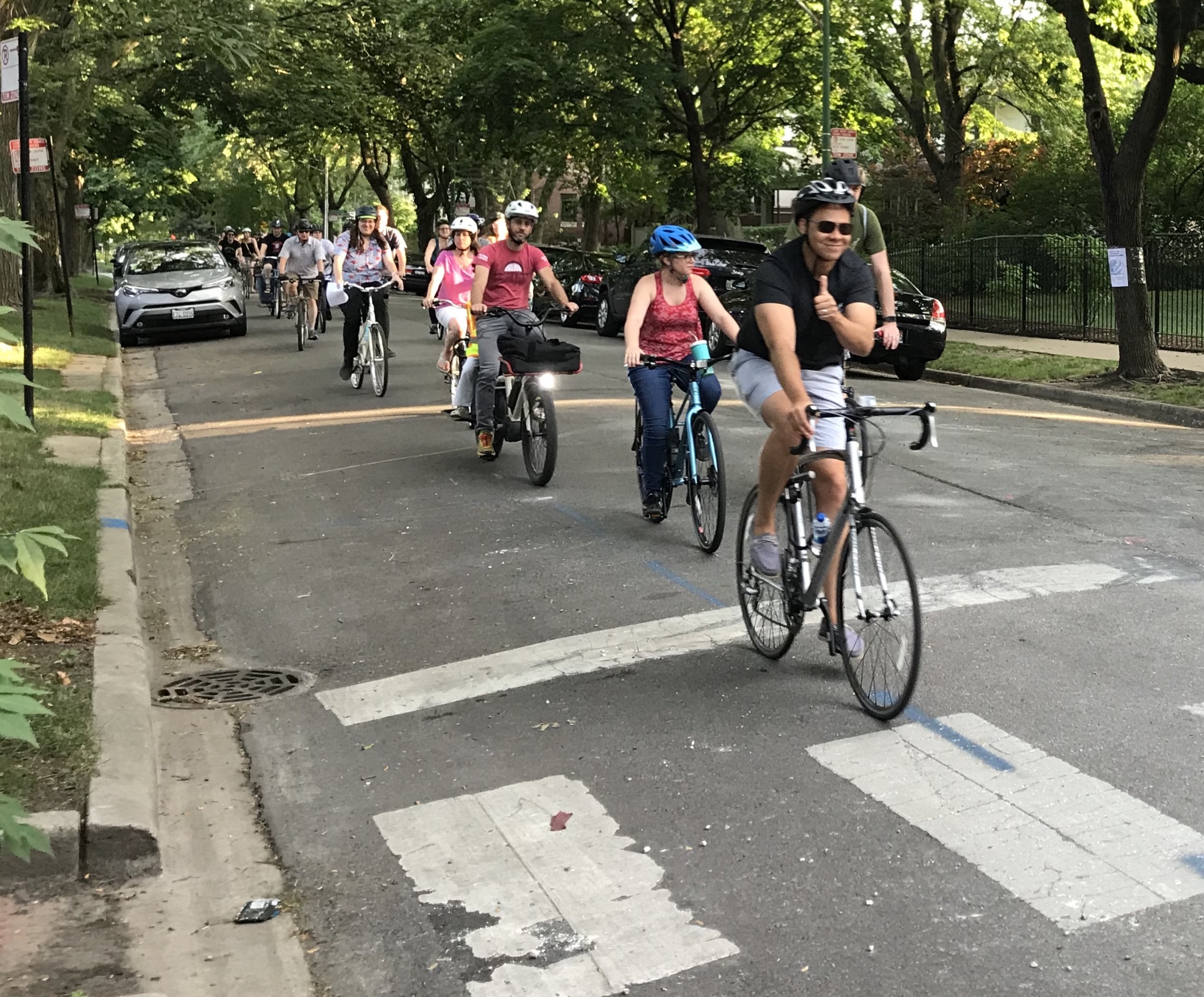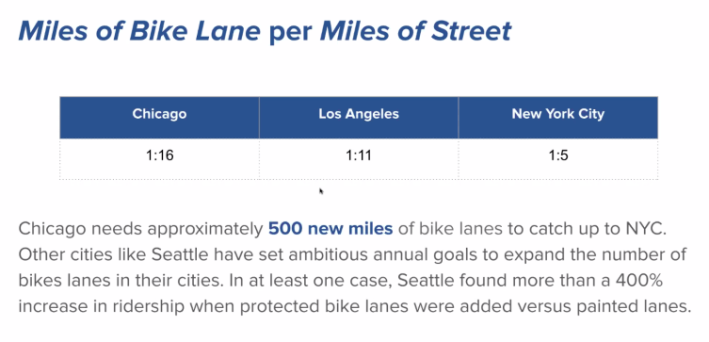47th Ward alderman Matt Martin was elected in 2018 along with a wave of new City Council leadership. Martin quickly established himself as a transit- and bike- friendly alderman. For example, he proactively reached out to the bikeways advocacy site Bike Lane Uprising to discuss the needs of cyclists; engaged in community outreach to prevent backlash to the Leland Greenway extension; and has put on a number of community discussions related to sustainable transportation. He was also the first alderman to bring a Slow Street to his ward with the Leland Shared Street.
This week Martin held a 47th Ward Transportation and Infrastructure Budget Town Hall. This was an opportunity for the alderman to update residents on the state of the city of Chicago’s transportation budget and obtain feedback on his constituents' priorities for transportation spending.
The meeting started off with facts and figures. The Chicago Department of Transportation’s total budget in 2020 was $468 million with less than half, $183 million, coming from local funding. The CTA is a sister agency and, unlike CDOT, the City Council does not have oversight and control over its budget, which is instead approved by a board of directors. Martin noted that some wards have tax increment financing funds available for transportation infrastructure, while others do not, which he said leads to inequities.
Martin then went over some of the types of projects included in CDOT's transportation and infrastructure budget. These include traffic calming strategies like bump-outs and crosswalks, as well as traffic studies. Also included are pedestrian spaces like Giddings Plaza and Northcenter Town Square, bike infrastructure, and capital improvement funds for street resurfacing, sidewalk repairs, and street lights
One thing I’ve always loved about Martin’s presentations to the community is that he always brings up the concept of making projects reflect the community's values. I first heard him mention values at the first open house for the Leland Greenway extension. He said he saw the greenway extension is a way to help support folks in and outside of his ward “live their values” by traveling sustainably.
Tuesday’s budget conversation was no different. Martin said his values when it comes to transportation are:
1. Ensuring streets and sidewalks are safe for children, the elderly, people with disabilities, and others who are walking and biking.
2. Prioritizing environmental sustainability..
3. Distributing infrastructure funds equitably across the city and ensuring the city is using a coordinated, holistic approach to planning
Martin mentioned Vision Zero, the city's effort to eliminate all serious and fatal traffic crashes, and his desire to use data to fix dangerous intersections within his ward. Most of the problematic intersections are along Western Avenue and Irving Park, the wards main multilane arterials. Unfortunately those roads are controlled by the Illinois Department of Transportation or Cook County, which complicates efforts to improve safety.
Martin noted that transportation is the number one source of carbon emissions, and solo car use is unsustainable. “We need to incentivize folks to walk, bike, or use transit when they’re able to. Part of that is improving infrastructure.” He acknowledged that electric cars, while reducing some emissions, still contribute to pollution, particularly car tire and brake pad particulate matter. And, of course, electric vehicles are a space-inefficient travel mode, and people who drive them can still cause traffic violence.
Martin noted that Chicago is lagging far behind peer cities when it comes to miles of bike lnaes per miles of street. He added that bike lanes with physical protection see higher ridership and that expanding the network of barrier-protected bike lanes in Chicago will lead to more people biking, especially families with children.
Martin next addressed the issue of transportation funding equity. One notable part of the discussion was Martin showing an image of how a number of North Side wards can fit inside the 10th ward, the largest ward, which located at the southeast corner of the city and contains Lake Calumet. Most Chicago wards have about 50,000 residents, and they each get $1.32 million in annual discretionary "menu" funds for infrastructure. Martin argued that this is inequitable, because geographically larger wards with more road miles need more funding..

Martin added that the lower density of bikeways on the South and West sides compared to the North Side is also inequitable. “We are not where we need to be in terms of protected bike lanes and greenways. The hope is to work with the new transportation commissioner [Gia Biagi] to incentivizing folks to bike.”
One idea Martin has is more master planning. “Cities like Seattle, Portland, and Minneapolis have bike or pedestrian master plans," he said. "Most other cities don’t rely on the City Council for capital improvements, and I think that’s important. Yes it’s important that aldermen have their fingers on the pulse of their community, figure out the needs, and share it with various departments, but we do not have the personnel that can really look holistically and say how much we should be spending in particular areas. It’s going to be really critical in the coming years that we have those robust master plans that we don’t just put out every few years, but truly touch base on to see if we’re meeting those benchmarks.”
Martin would also like to see more traffic engineers. Chicago currently has six traffic engineers to analyze problematic intersections. Portland, a city that is a quarter of the population of Chicago, has 11. More widespread vehicle charging for electric cars was also mentioned. I would have liked to have heard Martin mention charging stations for electric bikes as well. Lastly, Martin said he would like to see traffic enforcement moved from the Chicago Police Department to a different agency.
Here are a couple highlights from the Q & A session at the end of the event.
Q: What are your priorities when it comes to the need for fewer parking spaces [to make room for more pedestrian, transit, and bike space] while balancing the needs of local residents, businesses, and the parking meter deal?
A: It’s challenging. We need to make sure we’re including a mix of protected bike lanes and greenways. Central planning plays a critical role in that. One of the things we want to make sure we’re doing is engaging other aldermen in terms of improvements they want to see. We want to make sure we’re not the lonely voice in the room but are part of a caucus of folks who have great ideas and want to see best practices implemented.
Currently we don’t have the personnel at CDOT to actualize these ideas. When it comes to transportation issues, we need to be pressing folks in different parts of city government to look at what our sister cities are doing so that we can get a nice return on our investments. There’s definitely some hesitation to have funding in a lockbox given this challenging budget environment. I get that, especially as COVID has shown us we need to have some flexibility.
We can acknowledge that but not be burdened by it. This applies not only to transportation but housing and environmental issues as well. When you have that austerity mindset that leads to incremental changes when you need more bold, transformational changes when it comes to policy change and funding.
Q: What non-budget policies will you support or introduce to support sustainable mobility and budget priorities?
A: Some of the things that come to mind: when it comes to our menu funds, we need to increase the amount of money in proportion to the [geographic] size of the ward. It does have budgetary elements but when it comes to planning and auditing, doing routine and proactive auditing of our streets and infrastructure.
Another thing that comes to mind: using our existing resources more efficiently and thoughtfully. We have one chief sustainability officer who is located in the mayor’s office. Some of these issues we’ve discussed are intersectional. We need someone who can take the lead and quarterback these issues. We have thousands of vacancies that we fund annually and because of changing needs we can find new ways to engage people who are already employed.
Finally, transparency. One of the ways we see policy change is through accessible information. We need open data portals on the city’s website and elsewhere so that folks can say, “Hey, it’s great we’re filling potholes and repaving streets when necessary but if that’s largely what we’re doing with our menu funds; we have all these cracked sidewalks or nonexistent sidewalks, along with a need for protected bike lanes.” Having that sort of information for residents to review and take to their aldermen is critical.
I encourage you to check out the recording of the discussion. I always walk away from Martin’s community meetings more informed about the way our city functions. If you are a resident of the 47th ward or just want to be involved in efforts to improve transportation in the 47th ward and throughout the city, the 47th ward Transportation Committee is open to anyone. You can apply here.





